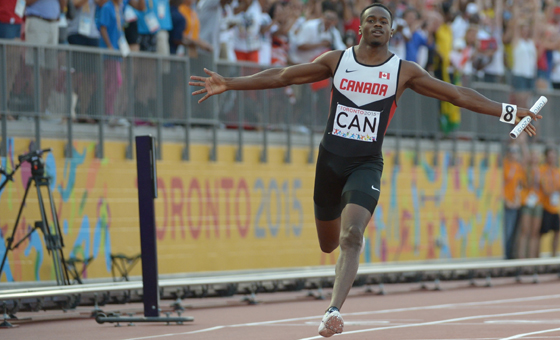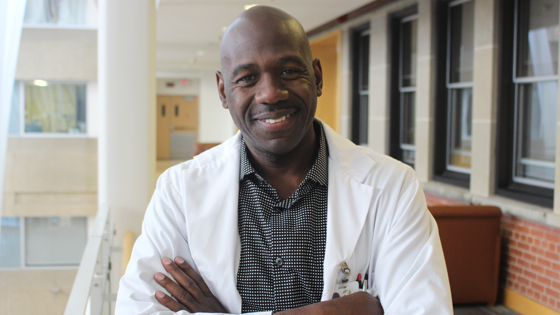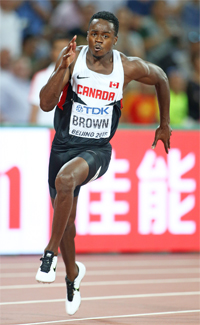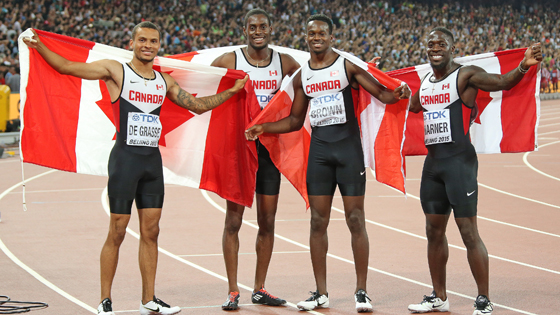
Among those in Rio this week to root for Canadian sprinter Aaron Brown, pictured above, will be his father, Ian Brown, an ophthalmology technician at Toronto Western Hospital. (Photo: Canadian Olympic Committee)
Ian Brown's infectious grin spreads from ear to ear when the subject of conversation turns to his son Aaron, a member of the Canadian Olympic Team at the Rio Games.
Ian Brown, an ophthalmology technician at Toronto Western Hospital's Donald K. Johnson Eye Centre, is preparing for a trip to Brazil with his wife Sonia to support Aaron, who represents Canada in the men's 100-metre, 200-metre, and 4×100-metre events.
"There's nothing better than watching your son compete in a major event like this," says Ian, who has worked at UHN for 16 years. Sonia is a nurse at Michael Garron Hospital, formerly known as Toronto East General Hospital.
"I can't emphasize enough how proud he is to represent Canada." Ian says. "This is something he set out to accomplish at a very young age. He's realizing his dream."
Aaron Brown, 24, a graduate of Birchmount Park Collegiate Institute in Scarborough and the University of Southern California, previously represented Canada at the London Games in 2014. While the then 20-year-old wasn't expected to pick up a medal, Aaron surprised many observers by finishing ninth overall in the 200-metre event.
The finish in London provided a jolt for Aaron Brown, who returned to his training re-energized. Earlier this summer, Aaron Brown became just the fourth Canadian to crack the 10-second barrier in a 100- metre event when he raced to time of 9.96 at a meet in Florida.
Before departing for Rio, Ian Brown met with UHN News to discuss his son's incredible journey to the Olympic Games.

Ian Brown will be cheering from the stands this week at the Rio Gamers when son his son Aaron Brown hits the track representing Canada in the men's 100-metre, 200-metre, and 4×100-metre events. (Photo: UHN News)
How long has Aaron been interested in sprinting and athletics?
His interest in athletics started at a young age. It started with soccer. He was always fast. He tried baseball for a bit and then basketball, and he was quite successful, and then he got to high school he played both basketball and football. He was a receiver and he had a lot of success with that. He only pursued track because he wanted to get faster, so that he could work on his foot speed. He did that and the track coach said, 'You know, have you thought about focusing on this instead of football?'
So he had to decide between football and sprinting?
Yes, exactly. He loved both. All his friends were in football and it was a bit more glamorous thing to do and he was having a lot of success with it. But on the track side, he realized that he could represent Canada internationally as a junior. That's where you compete against other young sprinters from around the world. He was competing with other 16 and 17-year-olds and he came back with a silver medal in the 100-metres. That's when he made the decision to make a serious commitment.
How did that first taste of success help him?
After he won that first medal, a lot of U.S. colleges noticed. We talked about it and agreed if he was going to get serious about this, he needed to go to the States and run against more serious competition. So, he accepted a scholarship to the University of Southern California.
How did it make you feel when he decided to move to Los Angeles?
We went on the scouting trips and, of all the schools, we liked USC the most because it had a good blend of athletics and academics.
Did you have a touch of empty nest syndrome when he left?
Not really. Technology has become a really big part of our family. Because of Skype and Facebook and Twitter, we've been able to keep up with what he is doing. Personally, there is a sense of pride because there are all these videos out there of him.
Are you able to watch him race live?
Oh yeah, we probably see seven or eight live races per year. The rest we see after the fact.
Were you surprised when he was invited to compete at the London Games in 2012?
Yes, he was basically an up-and-comer at that point. What I think Canada has done well, in terms of helping their athletes get better, is spot a few rising stars. He went basically to get the experience of going to the Olympics, competing at the highest level, seeing who is there, what it takes to get there. Then he finished ninth overall in the 200-metre event.

Canadian sprint Aaron Brown is just the fourth Canadian to crack the 10-second barrier in a 100-metre race. (Photo: Athletics Canada)
What was it like for you to be in the stadium watching your son compete in the Olympics?
It was surreal. It sounds cliché, but when you are actually there, there is a sense of pride that your son is representing your country, and then there's that, 'Oh my gosh, I can't believe I'm actually in the stadium, with the noise and the atmosphere.'
In London, Aaron ran against Usain Bolt, the fastest man in the world. Can you describe what that experience was like?
Usain Bolt comes out and there is this huge roar from the crowd. And then there is our son standing next to him. Bolt is doing his thing, hamming it up for the crowd and he comes over to Aaron and gives him a high-five. I was thinking, 'Oh my, he's the best in the world and my son is on the same track as him.'
What was going through your mind at that moment?
Aaron had a goal and accomplished it at a very young age. Not that he won his races, because he has more to accomplish in that respect, but he wanted to be in the Olympics, he wanted to run against the best and here he was laughing and hanging around with Usain Bolt. I was so proud for him.
Aaron is a member of Canada's 4×100-metre relay team. Do you think he has the best chance to win a medal in this event?
Yes, because of the overall depth of the Canadian team. They feel like they can compete for a medal, definitely a bronze, and maybe a silver.

Andre De Grasse, from left, Brendon Rodney, Aaron Brown and Justyn Warner won bronze in the men’s 4×100-metre relay event at the world championships last summer. The team will compete this week at the Rio Games. (Photo: Athletics Canada)
What type of relationship does Aaron have with Andre De Grasse, his teammate and Canada's top sprinter in the 100-metre?
Aaron actually recruited Andre to come to USC. The sprint world is very small, especially in Canada. They are good friends off the track. But on the track, they both realize they have a job to do. It's a very friendly rivalry. They push each other to be better and hopefully Canada benefits from that.
Did you have any final advice for Aaron before he left?
My advice to him was to keep his mind focused. Once your body is clicking and doing what it can and you've pushed it so far, the next thing is to get your mind right and not get distracted. There are so many mind games sprinters use. I told him to stay poised and be ready when the starting pistol goes off.
So who does Aaron get the Olympic genes from, you or your wife?
I like to think it's from me. In high school, we both sprinted, so it can go either way, but my wife has an edge on me because Aaron has a cousin on my wife's side who is a sprinter as well. She is a junior sprinter for Canada in the 200-metre.
